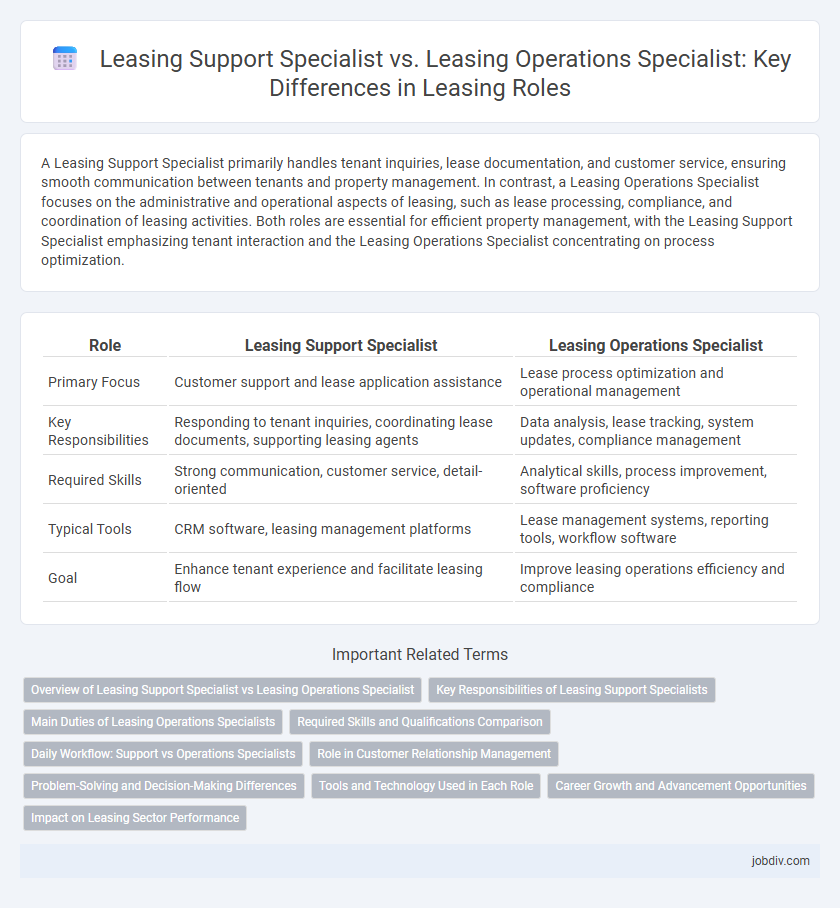A Leasing Support Specialist primarily handles tenant inquiries, lease documentation, and customer service, ensuring smooth communication between tenants and property management. In contrast, a Leasing Operations Specialist focuses on the administrative and operational aspects of leasing, such as lease processing, compliance, and coordination of leasing activities. Both roles are essential for efficient property management, with the Leasing Support Specialist emphasizing tenant interaction and the Leasing Operations Specialist concentrating on process optimization.
Table of Comparison
| Role | Leasing Support Specialist | Leasing Operations Specialist |
|---|---|---|
| Primary Focus | Customer support and lease application assistance | Lease process optimization and operational management |
| Key Responsibilities | Responding to tenant inquiries, coordinating lease documents, supporting leasing agents | Data analysis, lease tracking, system updates, compliance management |
| Required Skills | Strong communication, customer service, detail-oriented | Analytical skills, process improvement, software proficiency |
| Typical Tools | CRM software, leasing management platforms | Lease management systems, reporting tools, workflow software |
| Goal | Enhance tenant experience and facilitate leasing flow | Improve leasing operations efficiency and compliance |
Overview of Leasing Support Specialist vs Leasing Operations Specialist
Leasing Support Specialists primarily handle tenant relations, lease documentation, and coordinating property viewings to ensure a seamless rental process. Leasing Operations Specialists focus on the administrative and logistical aspects, including lease processing, compliance monitoring, and managing lease renewals for operational efficiency. Both roles are essential for optimizing leasing workflows but differ in their emphasis on customer interaction versus operational execution.
Key Responsibilities of Leasing Support Specialists
Leasing Support Specialists primarily manage tenant inquiries, coordinate lease documentation, and ensure accurate record-keeping to facilitate seamless leasing processes. They handle communication between prospective tenants and leasing agents, support lease contract preparation, and maintain compliance with company policies. Their role is crucial for enhancing tenant satisfaction and streamlining administrative tasks within property management operations.
Main Duties of Leasing Operations Specialists
Leasing Operations Specialists primarily manage lease administration, ensuring accurate documentation, compliance with regulations, and timely processing of lease agreements. They coordinate tenant move-ins and move-outs, handle financial reporting, and support lease audits to maintain operational efficiency. Their role emphasizes streamlining leasing workflows, improving lease management systems, and facilitating communication between departments to optimize property management processes.
Required Skills and Qualifications Comparison
Leasing Support Specialists require strong communication skills, proficiency in property management software, and the ability to handle tenant inquiries efficiently. Leasing Operations Specialists demand expertise in lease administration, data analysis, and process optimization to ensure smooth leasing workflows. Both roles prioritize attention to detail, organizational skills, and knowledge of leasing regulations, but Operations Specialists often need advanced technical and analytical competencies.
Daily Workflow: Support vs Operations Specialists
Leasing Support Specialists focus on managing tenant inquiries, assisting with application processing, and providing customer service to ensure smooth communication throughout the leasing process. Leasing Operations Specialists handle the backend tasks such as lease documentation, compliance checks, and coordinating with property management systems to maintain operational efficiency. The daily workflow of Support Specialists centers on direct client interaction, while Operations Specialists prioritize administrative accuracy and operational continuity.
Role in Customer Relationship Management
Leasing Support Specialists primarily handle tenant inquiries, lease documentation, and maintain ongoing communication to ensure tenant satisfaction and retention. Leasing Operations Specialists focus on streamlining leasing processes, managing data accuracy, and coordinating between departments to enhance operational efficiency in customer interactions. Both roles contribute to customer relationship management by balancing personalized tenant support with efficient leasing operations.
Problem-Solving and Decision-Making Differences
Leasing Support Specialists focus on resolving tenant inquiries and paperwork issues, utilizing problem-solving skills to address individual client concerns efficiently. Leasing Operations Specialists handle broader decision-making tasks involving lease compliance, process optimization, and coordination between departments to ensure smooth operational flow. The former emphasizes customer-centered solutions, while the latter prioritizes strategic decisions affecting overall leasing procedures.
Tools and Technology Used in Each Role
Leasing Support Specialists primarily utilize customer relationship management (CRM) software and leasing management platforms like Yardi or RealPage to coordinate tenant communications and process applications efficiently. Leasing Operations Specialists often work with advanced data analytics tools, property management systems, and workflow automation software to optimize leasing processes and ensure compliance with operational standards. Both roles leverage digital signature software and cloud-based document management to enhance productivity and streamline lease administration.
Career Growth and Advancement Opportunities
Leasing Support Specialists typically focus on tenant assistance and administrative tasks, building foundational skills in customer service and property management. Leasing Operations Specialists handle broader operational responsibilities, including lease processing, reporting, and compliance, which provide deeper insights into property management systems and strategies. Career growth for Leasing Operations Specialists often leads to management roles, while Leasing Support Specialists may advance into operations or leasing consultant positions with increased experience.
Impact on Leasing Sector Performance
Leasing Support Specialists enhance tenant satisfaction and retention by managing inquiries, processing applications efficiently, and resolving issues promptly, directly boosting leasing performance metrics. Leasing Operations Specialists optimize leasing workflows through data analysis, process improvements, and compliance management, driving operational efficiency and reducing vacancy rates. Together, these roles synergize to improve tenant experience and streamline leasing operations, significantly impacting the overall leasing sector performance.
Leasing Support Specialist vs Leasing Operations Specialist Infographic

 jobdiv.com
jobdiv.com